
Follies is a musical with music and lyrics by Stephen Sondheim and a book by James Goldman.
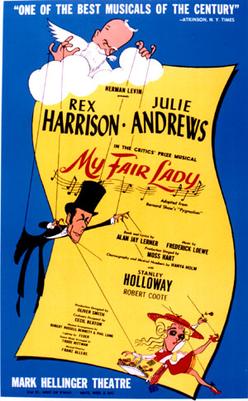
My Fair Lady is a musical with a book and lyrics by Alan Jay Lerner and music by Frederick Loewe. The story, based on the 1938 film adaptation of George Bernard Shaw's 1913 play Pygmalion, concerns Eliza Doolittle, a Cockney flower girl who takes speech lessons from professor Henry Higgins, a phonetician, so that she may pass as a lady. Despite his cynical nature and difficulty understanding women, Higgins grows attached to her.

Kiss Me, Kate is a musical with music and lyrics by Cole Porter and a book by Bella and Samuel Spewack. The story involves the production of a musical version of William Shakespeare's The Taming of the Shrew and the conflict on and off-stage between Fred Graham, the show's director, producer, and star, and his leading lady, his ex-wife Lilli Vanessi. A secondary romance concerns Lois Lane, the actress playing Bianca, and her gambler boyfriend, Bill, who runs afoul of some gangsters. The original production starred Alfred Drake, Patricia Morison, Lisa Kirk and Harold Lang.
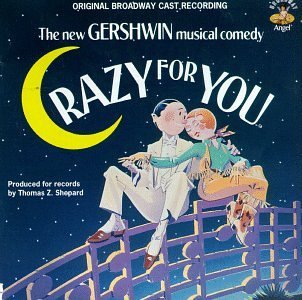
Crazy for You is a romantic comedy musical with a book by Ken Ludwig, lyrics by Ira Gershwin, and music by George Gershwin. Billed as "The New Gershwin Musical Comedy", it is largely based on the songwriting team's 1930 musical Girl Crazy, but also incorporates songs from several other productions. It won the 1992 Tony Award (Broadway), the 1993 Olivier Award (London), and the 1994 Dora Award (Toronto) for Best Musical.
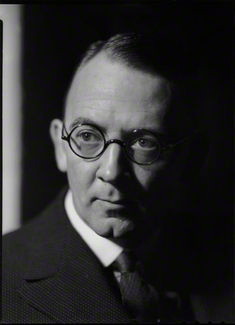
Noel Gay was born Reginald Moxon Armitage. He also used the name Stanley Hill professionally. He was a successful British composer of popular music of the 1930s and 1940s whose output comprised 45 songs as well as the music for 28 films and 26 London shows. Sheridan Morley has commented that he was "the closest Britain ever came to a local Irving Berlin". He is best known for the musical, Me and My Girl.

The Gielgud Theatre is a West End theatre, located on Shaftesbury Avenue, at the corner of Rupert Street, in the City of Westminster, London. The house currently has 994 seats on three levels.
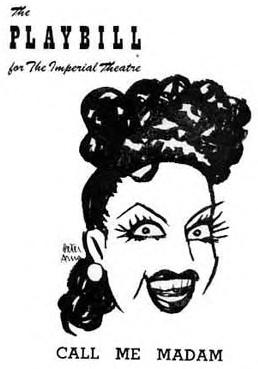
Call Me Madam is a Broadway musical written by Howard Lindsay and Russel Crouse, with music and lyrics by Irving Berlin.
Robert Lindsay Stevenson, known professionally as Robert Lindsay, is an English actor. He is the recipient of a British Academy Television Award, a Tony Award, and two Laurence Olivier Awards.

The Victoria Palace Theatre is a West End theatre in Victoria Street, in the City of Westminster, opposite Victoria Station. The structure is categorised as a Grade II* listed building.

Henry William George Lupino professionally Lupino Lane, was an English actor and theatre manager, and a member of the famous Lupino family, which eventually included his cousin, the screenwriter/director/actress Ida Lupino. Lane started out as a child performer, known as 'Little Nipper', and went on to appear in a wide range of theatrical, music hall and film performances. Increasingly celebrated for his silent comedy short subjects, he is best known in the United Kingdom for playing Bill Snibson in the play and film Me and My Girl, which popularized the song and dance routine "The Lambeth Walk".
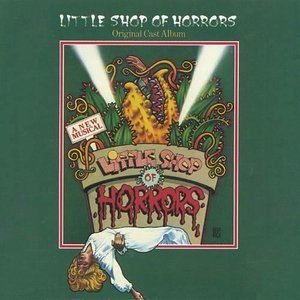
Little Shop of Horrors is a horror comedy rock musical with music by Alan Menken and lyrics and a book by Howard Ashman. The story follows a hapless florist shop worker who raises a plant that feeds on human blood and flesh. The musical is loosely based on the low-budget 1960 black comedy film The Little Shop of Horrors. The music, composed by Menken in the style of early 1960s rock and roll, doo-wop and early Motown, includes several well-known tunes, including the title song, "Skid Row (Downtown)", "Somewhere That's Green", and "Suddenly, Seymour".
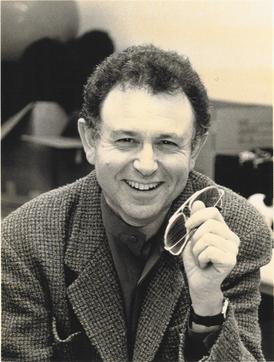
Michael Robert Ockrent was a British stage director, well-known both for his Broadway musicals and smaller niche plays. He was educated at Highgate School. Through directing Educating Rita, The Nerd and Follies, he became an established figure in London theatre. In 1986 he made a successful transition to New York City with Me and My Girl that earned several Tony Award nominations. In later life Ockrent worked in film, mainly straight-to-TV movies.

Christian Dominique Borle is an American actor and singer. He is a two-time Tony Award winner for his roles as Black Stache in Peter and the Starcatcher and as William Shakespeare in Something Rotten! Borle also originated the roles of Prince Herbert, et al. in Spamalot, Emmett in Legally Blonde, and Joe in Some Like It Hot on Broadway. He starred as Marvin in the 2016 Broadway revival of Falsettos. He also starred as Tom Levitt on the NBC musical-drama television series Smash and Vox in the dark-comedy musical Hazbin Hotel.

Sir Edward Seymour Hicks, better known as Seymour Hicks, was a British actor, music hall performer, playwright, actor-manager and producer. He became known, early in his career, for writing, starring in and producing Edwardian musical comedy, often together with his famous wife, Ellaline Terriss. His most famous acting role was that of Ebenezer Scrooge in Charles Dickens's A Christmas Carol.
The 41st Annual Tony Awards was held on June 7, 1987, at the Mark Hellinger Theatre and broadcast by CBS television. Angela Lansbury was the host for the third time. This broadcast was awarded the 1987 Primetime Emmy Award for Outstanding Variety, Music or Comedy Series.

David Waters is a stage, television, and film actor who began his professional performing arts career at La Boite Theatre, Brisbane then joined the Queensland Theatre Company in repertory for six years and Twelfth Night Theatre Company for two further years repertory. Waters was born in the UK and worked briefly as a journalist for George Newnes Press on their publications, Country Life and The New Musical Express, in London. He migrated to Australia in 1969.

The Casino Theatre was a Broadway theatre located at 1404 Broadway and West 39th Street in New York City. Built in 1882, it was a leading presenter of mostly musicals and operettas until it closed in 1930.

Eliza Doolittle is a fictional character and the protagonist in George Bernard Shaw's play Pygmalion (1913) and its 1956 musical adaptation, My Fair Lady.

The Lambeth Walk is a 1939 British musical comedy film directed by Albert de Courville and starring Lupino Lane, Sally Gray and Seymour Hicks. It was an adaptation of the 1937 musical Me and My Girl, and was released under that title in the U.S. The film takes its British title from the play's best known song, "The Lambeth Walk". The star of the musical, Lupino Lane, reprised his lead role in the film.
Twenty to One was a British musical comedy first performed in 1935. The musical was a farce set around the world of horseracing. Bill Snibson, a bookmaker, joins an anti-gambling organisation in a fit of guilt. It ran for other four hundred performances at the Coliseum Theatre in the West End. Combined with provincial tours it ran for over a thousand shows. It was written by Louis Arthur Rose. The music was composed by Billy Mayerl.
















